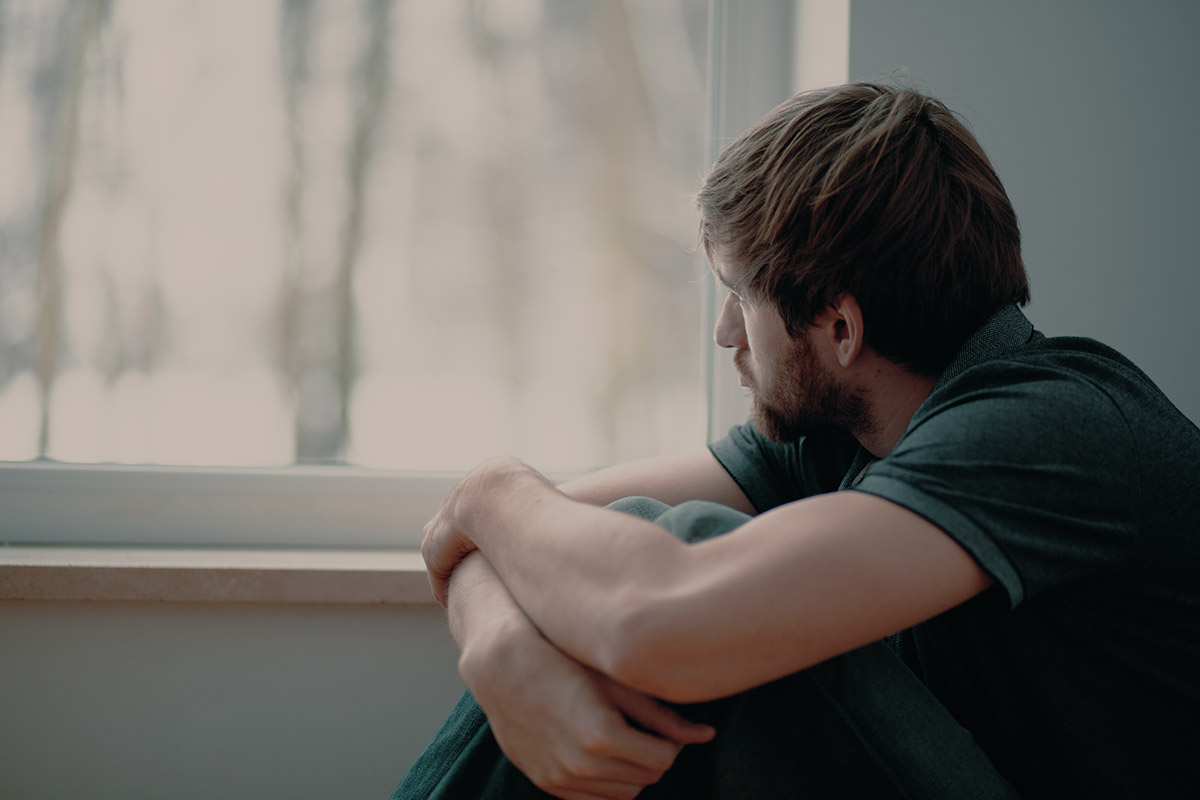Post-traumatic stress disorder, or PTSD, can affect anyone who has experienced a traumatic event. But did you know that men are more likely to experience PTSD than women? In fact, according to the National Center for PTSD, men are about twice as likely as women to develop PTSD. If you’re a man and you’re experiencing some of the symptoms of PTSD, it’s important to get help. This blog post will discuss the symptoms of PTSD in men and how to get help.
Contents
What Is PTSD In Men?
 PTSD in men is a mental health condition that’s triggered by a terrifying event — either experiencing it or witnessing it. Symptoms may include flashbacks, nightmares, and severe anxiety, as well as uncontrollable thoughts about the event.
PTSD in men is a mental health condition that’s triggered by a terrifying event — either experiencing it or witnessing it. Symptoms may include flashbacks, nightmares, and severe anxiety, as well as uncontrollable thoughts about the event.
Most people who go through traumatic events don’t develop PTSD. But if your trauma was especially severe — or if you had trouble coping in the aftermath — you may be at risk.
PTSD symptoms usually start within three months of the traumatic event, but sometimes they don’t appear until years later. They also vary in severity and duration.
PTSD in Men also can be accompanied by depression, substance abuse, or other problems.
PTSD in Men is treatable, but seeking help is often hard. The first step is to talk to your doctor or mental health professional.
If you think you might have PTSD, please see a doctor as soon as possible. Early diagnosis and treatment can make a big difference. There are several effective treatments for PTSD, including therapy, medication, and support groups. You don’t have to go through this alone — reach out for help.
What Are the Symptoms of PTSD in Men?

PTSD in men can cause a variety of symptoms. These may include:
Flashbacks
Reliving the traumatic event over and over, as if it’s happening again. This can happen in your mind or through dreams. You may also feel like you’re re-experiencing the trauma in your body. Sometimes flashbacks are also called intrusive memories.
Nightmares
Bad dreams or nightmares about the traumatic event. These may be so real that you wake up feeling frightened or sweating.
Avoidance
You may try to avoid anything that reminds you of the trauma, including people, places, thoughts, or situations. You may even avoid talking about the event.
Changes in thinking and mood
It’s common to have trouble after a trauma remembering things or concentrating. You may also feel numb, detached from others, or have negative thoughts (such as “I’m bad,” “the world is dangerous,” or “I’ll never be good again”). Also, You may lose interest in activities you once enjoyed. You might feel irritable, more aggressive than before, or have sudden mood swings.
Changes in physical and emotional reactions
You may be more irritable, anxious, or easily startled than before. You may also have trouble sleeping or lose interest in sex. Your startle response may be stronger than it was before. You might feel like your life is in danger, even when it isn’t. Or you may feel hopeless about the future.
Constant reminders of the event
You may be constantly on guard for signs of danger. This can lead to exhaustion and cause you to miss work or avoid social activities. You might also have trouble driving or being in crowded places.
Feeling keyed up
You may be jittery, easily agitated, or always on the lookout for signs of danger. This is called hyperarousal. It can make you feel like you’re in danger all the time, even when you’re not. Sometimes there may also be physical symptoms, such as a racing heart, sweating, or trouble sleeping.
Constant fatigue
You may feel exhausted all the time. This can make it hard to concentrate or do your usual activities. This fatigue also may cause you to have trouble sleeping.
How Common Are PTSD Symptoms in Men?
PTSD symptoms are more common in men than women, but the reason for this is not clear. One theory is that because men are more likely to experience trauma, they are also more likely to develop PTSD. Another theory is that men are less likely to seek help for their symptoms, which can lead to a delay in diagnosis and treatment.
PTSD symptoms can vary from person to person, but some common signs may be indicative of the disorder.
There are very rarely some people who experience “flashbacks” where they relive the trauma over and over again. Other people may have nightmares or intrusive thoughts about the event. Many people with PTSD avoid anything that reminds them of the trauma, including people, places, and activities. avoidance can be so severe that it interferes with work, social life, and family life.
A person with PTSD may also feel detached from others and have difficulty experiencing positive emotions. They may feel numb or lose interest in things they once enjoyed. It’s not uncommon for people with PTSD to turn to alcohol or drugs to self-medicate.
There are about half of men will experience at least one symptom of PTSD in their lifetime. If you are struggling with any of the symptoms listed above, it’s important to seek professional help.
Impacts of PTSD Symptoms in Men
 PTSD can have a significant impact on every aspect of a man’s life. It can lead to problems at work, in relationships, and with alcohol and drugs. It can cause anxiety, depression, and sleep problems. If you’re having any of these symptoms, it’s important to get help.
PTSD can have a significant impact on every aspect of a man’s life. It can lead to problems at work, in relationships, and with alcohol and drugs. It can cause anxiety, depression, and sleep problems. If you’re having any of these symptoms, it’s important to get help.
Some of these impacts are:
Relationships
One of the men I spoke with, Matt, said that his PTSD symptoms led to him withdrawing from friends and family. He became irritable and would often lash out. As a result, he lost close relationships and felt isolated and alone.
Work
PTSD can also make it hard to concentrate at work or keep a job. For some men, the thought of going to work triggers their PTSD symptoms. This can lead to absenteeism, lost productivity, and even getting fired.
Substance Abuse
Many men self-medicate with alcohol or drugs to try to cope with their PTSD symptoms. This can lead to addiction and make PTSD symptoms worse. It’s important to get help from a mental health professional if you’re struggling with substance abuse.
Physical Health
PTSD can also lead to physical health problems. Men with PTSD are more likely to have heart disease, diabetes, and high blood pressure. They’re also at risk for gastrointestinal problems, sexual dysfunction, and chronic pain.
If you’re experiencing any of these symptoms, it’s important to get help from a mental health professional. PTSD is a treatable condition, but it requires professional help. Don’t try to tough it out on your own. Get help and start feeling better today.
How To Treat PTSD Symptoms in Men?

Treating PTSD requires seeking professional help. A therapist can help you understand your symptoms and work through them. You may also need medication to manage your symptoms. Getting treatment is essential to managing PTSD and living a healthy life.
If you think you might have PTSD, talk to your doctor or mental health professional. They can help you get an accurate diagnosis and develop a treatment plan. Don’t wait to get help if you’re struggling. The sooner you get treatment, the better chance you have of recovery.
These are some treatment options to consider:
Cognitive behavioral therapy
One of the main types of therapy for PTSD is called cognitive behavioral therapy (CBT). CBT helps you understand how your thoughts and feelings are connected. It can help you change the negative thought patterns that are part of PTSD.
Exposure therapy
This type of therapy can be helpful if you’re having a lot of nightmares or flashbacks. In exposure therapy, you work with a therapist to slowly and safely confront the things that trigger your symptoms. This can help decrease your fear and anxiety around these triggers.
Medication
Several types of medication can be used to treat PTSD. These include antidepressants, anti-anxiety medications, and antipsychotics. Medication can be very helpful in managing symptoms, but it’s important to work with a doctor to find the right medication and dose for you.
Support Groups
An important part of recovery is finding support. There are many groups of people with PTSD. These groups provide a safe place to share your experiences and connect with others who understand what you’re going through.
PTSD can be a difficult condition to live with, but there are many effective treatments available. If you think you might have PTSD, reach out for help from a mental health professional. With treatment, you can manage your symptoms and live a healthy, fulfilling life.
How To Manage PTSD Symptoms In Men?
These are some helpful tips for managing PTSD symptoms:
-Talk to someone who understands what you’re going through: A therapist can help you understand your symptoms and work through them. You may also need medication to manage your symptoms. Getting treatment for PTSD can be a long process, but it is worth it.
-Avoid alcohol and drugs: Self-medicating with drugs or alcohol will only make your symptoms worse. If you’re struggling with addiction, get help from a treatment center.
-Exercise: Exercise releases endorphins, which have mood-boosting effects. A healthy diet and regular exercise can also help improve your sleep, which can be disrupted by PTSD.
-Connect with others: Being around other people can help you feel less alone. Join a support group or talk to friends and family members about what you’re going through. You may also find helpful online communities of people who understand what you’re going through.
Conclusion
PTSD is a serious mental health condition that can have a profound effect on every aspect of a man’s life. If you think you may be struggling with PTSD, it’s important to reach out for help. A qualified mental health professional can provide you with the support and treatment you need to manage your symptoms and start living a healthier, happier life.
Do not suffer in silence – get the help you need today.
Hope this article was of help to you! If you are suffering from PTSD, you may seek help from Therapy Mantra. We have a team of highly trained and experienced therapists who can provide you with the tools and skills necessary for overcoming PTSD. Contact us today to schedule an online therapy or download our free Android or iOS app for more information.


